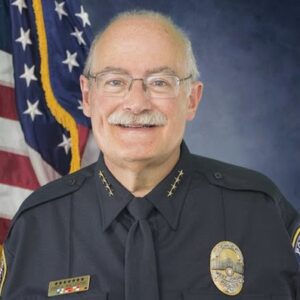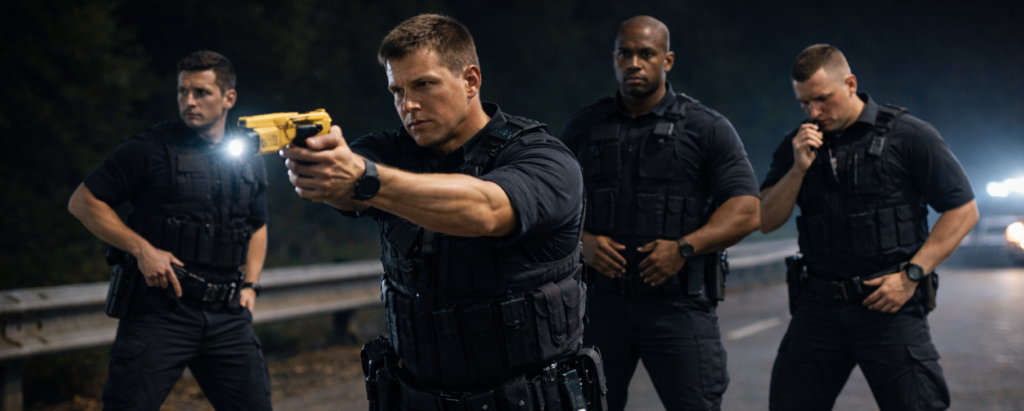United States v. Larremore, 2025 WL 2355525 (5th Cir. 2025)
Deputy Sheriff Christopher Colona was in a remote area monitoring traffic near a border patrol checkpoint near Marathon, Texas, at the time of a regularly scheduled Border Patrol shift change. He knew human traffickers often took advantage of the shift change to avoid detection. Deputy Colona saw a white truck, driven by James Eric Larremore, traveling north pulling an empty metal horse trailer. The trailer had an enclosed compartment large enough to hold people.
Deputy Colona recognized Larremore and his truck. Another officer had told the deputy Larremore was possibly smuggling people and/or drugs across the border. Colona also knew Larremore worked on his father’s ranch, which was located on the opposite end of the county.
Deputy Colona pulled onto the highway, briefly accelerated, then followed Larremore for just over a minute. Larremore pulled his truck and trailer to the shoulder, even though Colona did not signal him to stop. The deputy pulled in behind him and parked his patrol car behind the trailer. He approached Larremore’s truck on the passenger side. Larremore stuck his hand out and Deputy Colona reached into the truck and shook Larremore’s hand, saying it was “good to see you.” Deputy Colona asked Larremore how he was doing, whether he had any work, and where he was going. Larremore explained that he was driving to Odessa to sell the horse trailer.
As he spoke to Larremore, Deputy Colona rested his arm on the windowsill. He saw an open alcohol container sitting in plain view. Deputy Colona asked Larremore to “hang on a sec for me,” as he stepped back to his patrol car to provide dispatch with his location. Rather than wait, Larremore immediately got out of his truck, walked between the truck and trailer, and met Deputy Colona on the shoulder.
Deputy Colona saw a padlock locking the door to the enclosed compartment and asked Larremore if he had a key. Larremore said he didn’t. Deputy Colona asked what was in the compartment and Larremore said he had some saddles. Deputy Colona thought it was suspicious that Larremore was selling a trailer with saddles locked inside, but he had no key. When Deputy Colona told Larremore he wanted to look inside, Larremore just shrugged.
Larremore told Deputy Colona his girlfriend had locked the compartment, but somehow he couldn’t remember the girlfriend’s name. He also said he had just delivered a horse to Terlingua, Texas, which was hundreds of miles away from his father’s ranch. The trailer was registered in someone else’s name, compounding Deputy Colona’s suspicions.
Deputy Colona told Larremore that it seemed he might be smuggling drugs. After trying to persuade Larremore to open the compartment, Deputy Colona said he “need[ed] to look inside the trailer.” Larremore agreed and said, “Well, I guess go get your bolt cutters.” Larremore then changed his mind, asserting that he “has rights.” After asking would happen if he refused to allow Deputy Colona to look in the trailer, Larremore stated (repeatedly) there was something “embarrassing” in the trailer.
When Deputy Colona informed Larremore the open container of alcohol gave him grounds to search the trailer, Larremore said that he had “three cousins” in the trailer. He retrieved the key from the trailer fender well and opened the trailer. Deputy Colona found three undocumented immigrants inside.
Larremore was charged with two counts of human trafficking. At trial, he asked the court to suppress the evidence. The court denied his motion, ruling Deputy Colona had reasonable suspicion to detain Larremore and his consent to search the trailer attenuated any possible taint from the deputy’s alleged errors.
The court of appeals held there was no Fourth Amendment violation warranting suppression. In its decision, the court first addressed the alleged seizure. In Terry v. Ohio, (392 U.S. 1 (1968)), the U.S. Supreme Court held a “seizure” occurs when an “officer, by means of physical force or show of authority, has in some way restrained the liberty of a citizen.” The Court subsequently held that a person is seized “only if, in view of all of the circumstances surrounding the incident, a reasonable person would have believed that he was not free to leave” (United States v. Mendenhall, 446 U.S. 544 (1980)).
The court of appeals emphasized there was no signal to stop and Larremore stopped on his own. Deputy Colona testified he pulled behind Larremore not to investigate, but to check on his welfare. A welfare check is generally not a seizure. Larremore also claimed Deputy Colona “seized” him by resting his arm on Larremore’s windowsill after they shook hands. Viewing Deputy Colona’s body-worn camera recording, the court held the deputy’s contact with the windowsill was de minimis and not a seizure. Larremore also claimed that when Deputy Colona said, “hang on a sec,” it was a command to not move. The court disagreed, saying “the meaning of ‘hang on a sec’ does not plainly order someone to a location.”
In Mendenhall, the Supreme Court articulated several factors that would likely lead to a ruling that a seizure occurred, even when the subject did not try to flee. These factors include the threatening presence of several officers, the display of a weapon by an officer, or the use of language or tone of voice indicating compliance with the officer’s request might be compelled. Other than the fact that Deputy Colona was in uniform and had a holstered gun (a minor factor, according to the Court), none of those factors applied in this case. Deputy Colona talked nice!
The appellate court held that Larremore was seized at the point Deputy Colona said he “wanted to look inside” the trailer. According to the panel, Colona had had reasonable suspicion to initiate a Terry stop. Factors leading to reasonable suspicion included Larremore’s presence at the border checkpoint during shift change, driving on a route known for smuggling, and Larremore’s inconsistent stories about selling a trailer registered to someone else, the unnamed girlfriend locking the compartment with saddles, and his claim to have begun his trip from a border town.
When a detention is challenged, the court not only considers whether there was reasonable suspicion for the detention, but also the scope of the detention. Larremore contended Deputy Colona extended the detention unreasonably. The court disagreed, attributing the delays to Larremore’s equivocal and conflicting statements. The court also held Larremore’s continued nervous, evasive, and suspicious behavior gave Deputy Colona reason to extend the detention.
Finally, Larremore claimed Deputy Colona trespassed on his vehicle when he touched the windowsill. While officers should be mindful of not entering a vehicle without justification (including consent), Deputy Colona did not touch the truck to discover information, investigate, or gather evidence.
The court also determined the discovery of the open alcohol container was lawful and not subject to suppression. This case is an excellent example of two principles. First, talking nice, or using the language of consent and cooperation. Second, building reasonable suspicion through patient observation and conversation. The court affirmed Larremore’s conviction for human trafficking.



